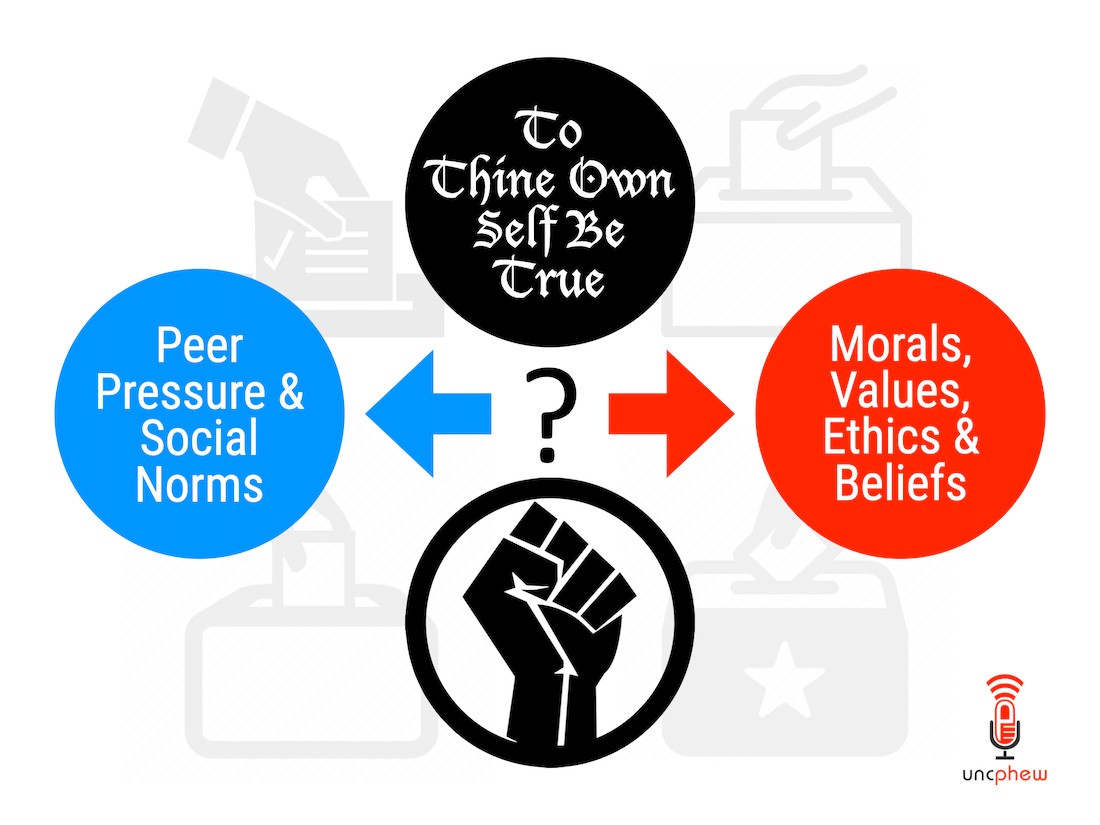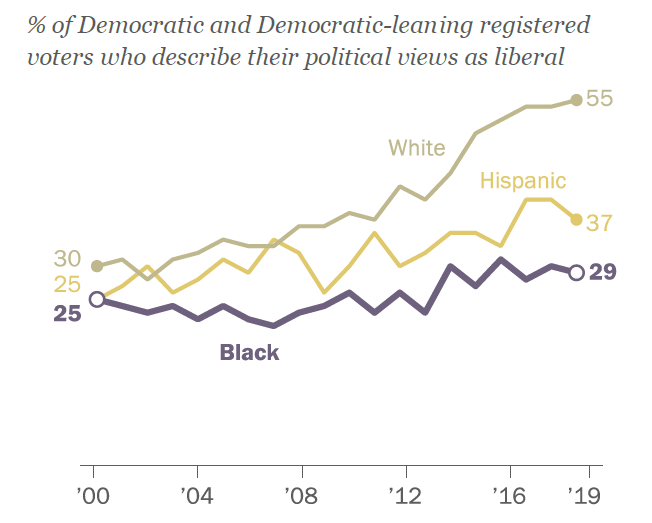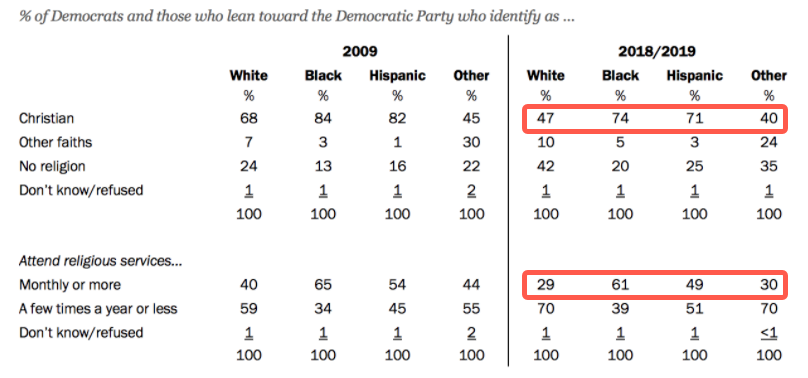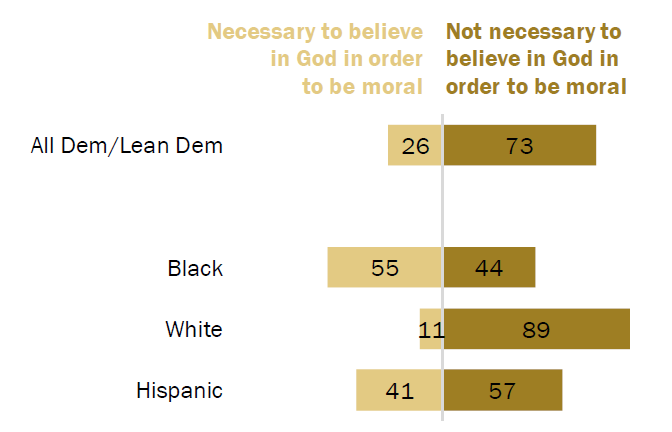
To Thine Own Self Be True
Collectively, one key voting bloc holds many values and beliefs traditionally viewed as moderate, or even conservative. If that is the case, why do such an overwhelmingly high percentage of that bloc continue to vote Democrat?
Key Characteristics of a Key Group
I’d like to talk briefly about a very important group of people. This group:
…considers themselves less liberal than any other group within their political party affiliation.
…values religion far more than the majority of people within their political party affiliation.
…considers “believing in God is a prerequisite for being moral” as far more important than the majority of people within their political party affiliation.
…is far less supportive of same-sex marriage than the majority of people within their political party affiliation.
…considers global warming as being less of a critical issue than the majority of people within their political party affiliation.
…throughout the course of American history, has aligned itself with the Republican party for many more decades than it has aligned itself with the Democrat party.
What Those Characteristics Suggest
How would you describe that group from a political perspective?
In reading that list of values and tendencies, I think of the word “conservative.”
Or, worst case, “moderate.”
What if I told you that same group voted 89% Democrat in the 2016 presidential election?
The group of which I am speaking is African Americans.
To Thine Own Self Be True
In Act 1, Scene III of Hamlet, Shakespeare wrote…
“This above all: to thine own self be true…”
This may feel like an odd context in which to be quoting that famous line, but that is exactly what I would say to my African American friends as they contemplate the 2020 United States Presidential election: to thine own self be true.
Hang with me.
Keep reading.
What I just said will make sense in the end.
Historical Overview
As I learned from doing considerable research on this topic – which I will share in this post – African Americans have a complicated history when it comes to U.S. politics.
Before we get to the ultimate point of this post, let’s briefly explore that history…
Most people know of the “old” historical connection between the Republican party and slavery.
The key point: the north, led by Abraham Lincoln – who was a Republican – fought the Civil War in large part to end slavery.
Beyond that, per battlefields.org (emphasis added):
“As the war drew to a close, but before the southern states were re-admitted to the United States, the northern states added the 13th, 14th, and 15th amendments to the Constitution. The amendments are also known as the “Civil War Amendments.” The 13th Amendment abolished slavery in the United States, the 14th Amendment guaranteed that citizens would receive “equal protection under the law,” and the 15th Amendment granted black men the right to vote.”
Accordingly, and as per Princeton.edu:
“When African American men first obtained the right to vote after the passage of the 15th Amendment in 1870 they nearly all identified and supported the Republican Party and its candidates; rewarding the Party of Lincoln for its commitment to ending slavery and expanding black civil rights.”
And per umbc.edu:
“Since the conclusion of the Civil War in 1865, African Americans had voted primarily with the Republican Party. The Republican Party was the party of Abraham Lincoln, “the Great Emancipator.” After Lincoln’s assassination, the so called “Radical Republicans” helped to establish the Freedman’s Bureau, passed the Civil Rights Act of 1866, and drafted the Fourteenth Amendment, preventing states from denying rights to U.S. citizens. In 1868, Ulysses S. Grant was elected President with the help of Southern African Americans, who were voting in a presidential election for the first time. During Grant’s presidency, the Radical Republicans introduced and ratified the Fifteenth Amendment, which stated that a citizen’s (male only) right to vote could not be denied because of “race, color, or previous condition of servitude.” African Americans, particularly former slaves, became loyal members of the Republican Party.”
So, at the conclusion of the Civil War, virtually all African Americans aligned with the Republican party.
And this positive connection continued for many decades. Per factcheck.org:
“Blacks mostly voted Republican from after the Civil War and through the early part of the 20th century. That’s not surprising when one considers that Abraham Lincoln was the first Republican president, and the white, segregationist politicians who governed Southern states in those days were Democrats. The Democratic Party didn’t welcome blacks then, and it wasn’t until 1924 that blacks were even permitted to attend Democratic conventions in any official capacity. Most blacks lived in the South, where they were mostly prevented from voting at all.
Even after that, Republican nominees continued to get a large slice of the black vote for several elections. Dwight D. Eisenhower got 39 percent in 1956, and Richard Nixon got 32 percent in his narrow loss to John F. Kennedy in 1960.”
Current Context
Fast forward to today.
Again quoting from that same Princeton.edu source:
“African Americans are Democrats. Since 1968 no Republican presidential candidate has received more than 13% of the African American vote and surveys of African Americans regularly show that upwards of 80% of African Americans self-identify as Democrats. However, understanding why African Americans are such steadfast supporters of the Democratic Party is not as straightforward as it seems. Although committed to the Democratic Party, African Americans are actually one of the most conservative blocs of Democratic supporters.”
Finally, as I already noted, 89% of blacks voted for Hillary Clinton in the 2016 election.
So, what changed along the way?
How did we go from almost every black being a Republican in 1865 to almost 90% voting blue in 2016?
And, if blacks are so relatively conservative, why do such a larger percentage continue to self-identify as Democrats?
Let’s address each of those questions individually.
What Changed: the Goldwater BLEXIT
Without going into all the detail, the shortest answer to the question “What changed along the way to cause African Americans to become Democrats?” is that there was a BLEXIT (“black exit”) of sorts from the Republican party that took place in the mid-1960s that was essentially caused by the actions of one man: Barry Goldwater.
Again quoting factcheck.org:
“But then President Lyndon B. Johnson pushed through the landmark Civil Rights Act of 1964 (outlawing segregation in public places) and his eventual Republican opponent, Sen. Barry Goldwater, opposed it. Johnson got 94 percent of the black vote that year, still a record for any presidential election.
The following year Johnson signed the 1965 Voting Rights Act. No Republican presidential candidate has gotten more than 15 percent of the black vote since.”
And per Princeton.edu:
“It was only when the Democratic Party took up the mantle of Civil Rights in the mid to late 1960’s that black support for the Party coalesced into the reliable Democratic voting bloc we know today.”
There is more nuance to this, of course, but this was the tipping point, the singular event that most people reference, which led to the shift from most African Americans being Republicans to the majority being Democrats.
So, based on these facts, one could argue that – if not for Barry Goldwater – most, or perhaps at least many, African Americans would still be Republicans.
Before we move on to the second question – “If blacks are so relatively conservative, why do such a larger percentage continue to self-identify as Democrats?” – let’s take a short detour and examine what matters the most to African American voters, and also how they view themselves in terms of their political orientation.
What Matters to African Americans & How They View Themselves Politically
Expanding on what I noted in the opening section above, per a 2020 Pew Research Center article, we learn the following facts about African American Democrats:
First, blacks are less likely to identify their political views as “liberal” than either white liberals, or hispanic liberals. Here are Pew’s findings:

So, based on that data, African Americans are the least liberal of all Democrats.
In fact, white Democrats are 1.9 times more likely to identify as liberal than their African American contemporaries.
That is worth noting because that is a significant gap.
And that is important because it could very well portend a growing philosophical disconnect between white Democrats, who have political ideologies that are generally far more extreme than blacks, and African American Democrats.
Second, God and religion matter far more to African Americans than to other Democrats, particularly in comparison to whites. Here are Pew’s research results on that point:


As you can see from these two graphics, black Democrats are…
…1.6 times more likely to identify as Christians than white Democrats, and
…attend “monthly or more” religious services more than twice as often as white Democrats.
Further, and perhaps more interestingly, blacks are the only Democrats within which a majority believe it is “necessary to believe in God in order to be moral.”
It is worth noting that the percentage of blacks who believe that it’s necessary to believe in God in order to be moral – 55% – is FIVE TIMES the percentage – 11% – of white Democrats who believe that.
This is perhaps even more compelling than the prior point, as that 5X disparity is enormous, particularly given the core, foundational nature of the issue at hand: the basis upon which one determines morality.
Third, compared to other Democrats, African Americans are far less likely to support the idea of same-sex marriage. Per Pew:
“Nearly nine-in-ten white Democrats (88%) say the legalization of same-sex marriage is good thing for society, compared with 76% of Hispanic Democrats and 52% of black Democrats. And while 67% of white Democrats say this development is very good for society, 44% of Hispanic Democrats and just 25% of black Democrats say the same.”
So, white Democrats are 2.7 times more likely than African American Democrats to believe that same-sex marriage is “very good” for society.
In fact, per Pew, the percentage of blacks who support same-sex marriage (52%) is almost the same as middle-age (30-49 years old) Republicans (50%), and less than young(18-29 years old) Republicans (59%).
So, on the issue of same-sex marriage, African American Democrats are closer philosophically to most Republicans than they are to their white Democrat contemporaries.
Fourth, compared to other Democrats, African Americans are less concerned about climate change. Per Pew:
“Fewer black Democrats (56%) see climate change as a very big problem for the country than white (79%) and Hispanic (72%) Democrats.”
Once more, we see African American Democrats taking a position more in line with converstatives than with liberals.
Fifth, African Americans are largely moderate-to-conservative by nature. Per Princeton.edu:
“Although committed to the Democratic Party, African Americans are actually one of the most conservative blocs of Democratic supporters.”
“For example, since the 1960’s there has been significant growth in both the black middle and upper classes and perhaps even more interesting, substantial diversification of black political views. Since the 1960’s blacks have become increasingly more moderate and even conservative on a number of important political issues including certain racial policies.”
Per factcheck.org:
“Younger African American voters have been edging away from the Democratic Party in recent years. David Bositis of the Joint Center notes “a fairly long-term pattern of decreasing identification with the Democrats by younger African Americans.”
Per fivethirtyeight.com:
“Pew Research Center found that a quarter of black Democrats identify as conservative, and 43 percent identify as moderate.”
Based on those stats, one could reasonably assume that – particularly when taking the prior points into consideration (low percentage of blacks that view themselves as liberal, high percentage that attend religious services regularly, high percentage that believe one needs to believe in God in order to be moral, etc.) – 25% of African Americans would vote Republican, and at least some portion of the 43% that identify as moderate would do the same.
If we assume that just one quarter of that 43% would vote Republican, that would then project to a total of 35 to 36% (25% who identify as conservative, and 1/4 of the 43% that identify as moderate) of African Americans voting Republican.
And yet 89% voted Democrat in 2016.
Huh?
What?
So, Why ARE African Americans Democrats?
Why does this disjunct exist?
Why do so many African Americans hold so many moderate or even conservative views, and yet vote so overwhelmingly for Democrats?
Here is what I found in researching that question (emphasis added):
Per Princeton.edu:
“…in an effort to leverage their political strength as a minority group in a majority based political system, black Americans have come to prioritize group solidarity in party politics. This partisan loyalty is maintained through a strategic social process that we call racialized social constraint, where by support for the Democratic Party has come to be defined as a norm of group behavior. In other words, supporting the Democratic Party has come to be understood as just something you do as a black person…
Adherence with this norm of Democratic Party support is insured through a set of social rewards and penalties which recognize compliance and punish defection of racial group members.”
“And it is within these segregated spaces that social rewards for compliance and penalties for defection can come to define an individual’s social status within the group. The result of all this is that to the extent that any individual black American values their relationship with other black Americans, they will continue to act in accordance with the group norm of party support lest they find themselves socially isolated.”
Per fivethirtyeight.com:
“So how to square that circle? How can a big chunk of black voters be unwavering Democrats who differ ideologically from the party? We spent years investigating that question for our new book, “Steadfast Democrats.” We found that black voters are so loyal to the Democratic party in part because of social pressure from other black voters.”
Per niskancenter.org:
“Today, I talk to Ismail White of Duke University and Chryl Laird of Bowdoin College about their Princeton book, Steadfast Democrats. They find that African Americans live in segregated communities and social networks that enforce a norm of democratic voting. Black voters are more supportive of republicans outside of these context of strong social pressure. I also talk to Tasha Philpot of the University of Texas about her Cambridge book, Conservative but Not Republican. She finds that black conservatism is meaningful and influential in policy attitudes but that partisanship is based more on shared group identity. Black attitudes have varied attitudes on issues and ideologies, but not those that promote vote choice.”
Per bloomberg.com:
“…an explanation for today’s puzzle what they call a “racialized social constraint” — pressure on black voters from black peer networks to adopt a partisan Democratic outlook.
During the 2012 campaign, for example, black voters were four times as likely as white voters to report that they expected sharp criticism from friends and family if they voted Republican. This phenomenon was not attributable to the fact that Barack Obama, the nation’s first black president, was on the ballot: In 2016, black voters expected disapproval at about the same rate as in 2012.
Here’s another striking result: The larger the proportion of a black person’s friends who are also black — what’s known as high racial homophily — the more likely he or she is to vote Democratic. For black voters who have a majority of non-black friends, however, the chance that he or she will vote Democratic drops to a coin flip. Among white voters, on the other hand, the link between racial homophily and voting behavior “is essentially zero.””
“Racialized Social Constraint”
When you sift through all of that, the answer to the question, “If so many African Americans hold moderate and conservative political views, why do they so overwhelmingly continue to vote Democrat?” can be answered in three words: “racialized social constraint.”
Another way of saying that: peer pressure.
Before I continue, please allow me to add the following:
First, I am not African American.
I therefore do not know what it is like to be African American.
I cannot begin to understand all the nuance inherent in being an African American, particularly right now, in the midst of the most turbulent era in recent American history, in the immediate aftermath of George Floyd and all that has followed.
So, before you say, “You have no idea what it’s like…,” understand that I am admitting that to you, up front.
I have no idea what it’s like.
I have no clue.
That said, I am not purporting to know what it’s like to be African American.
I am simply sharing findings, thoughts and observations that other, far more knowledgeable people have found, thought of or made.
These are not my thoughts per se.
You may accept or reject what I am sharing as you see fit.
If you agree with me, I respect that.
If you disagree with me, I respect that equally.
Second, all cultures have unique aspects.
Clearly, there are nuances within African American culture that are unique when it comes to peer pressure and voting.
As per the last sentence of the prior section, “Among white voters, on the other hand, the link between racial homophily and voting behavior “is essentially zero.”
For whatever reasons, a large gap exists between black and white culture on this point.
In black culture, this specific peer pressure appears very significant, whereas is white culture, it is virtually non-existent.
I don’t claim to understand why this is.
I am simply saying that others have researched this and written books based on their findings, and that is what they say.
Third, the stakes are very high in the upcoming election.
If you’ve made it this far, and no matter what your political orientation, odds are good that you fully understand how important this next presidential election really is.
There is so much at stake.
If there was ever a time to vote your true values, morals, ethics and beliefs, it is now.
To Thine Own Self Be True
Let’s cut to the chase.
To my African Americans friends everywhere, I say this: To your own self be true.
I am not telling you for whom you should vote.
I am not going to say a single word, good or bad, about either candidate, or even mention their names.
What I am going to say, sincerely and humbly, is the following:
…VOTE YOUR VALUES.
…VOTE YOUR MORALS.
…VOTE YOUR ETHICS.
…VOTE YOUR BELIEFS.
And even beyond those things, I am asking you to THINK INDEPENDENTLY.
If thinking independently leads you to vote liberal, that’s great.
And if thinking independently leads you to vote conservative, that’s great as well.
Not Asking You to Disrespect Anything
In making those requests, I am not asking you to disrespect your cultural norms.
Or your friends.
Or your family.
On the contrary, I am asking you to do what is truly best for you, whatever that may be.
While I understand and respect the idea of “solidarity” for purposes of maximizing political clout – I really do, and that actually makes a lot of sense – I would ask you to consider this: What good is it to have clout within a political framework that doesn’t necessarily line up with what you really value or believe?
To Thine Own Self Be True
At the end of this, that’s all I’m saying: to thine own self be true.
Whatever the true you is…
Whatever the true you values…
Whatever the true you believes…
VOTE FOR THAT.
CATCH UP ON OTHER UNCPHEW PODCASTS IN THE PLAYER BELOW!
